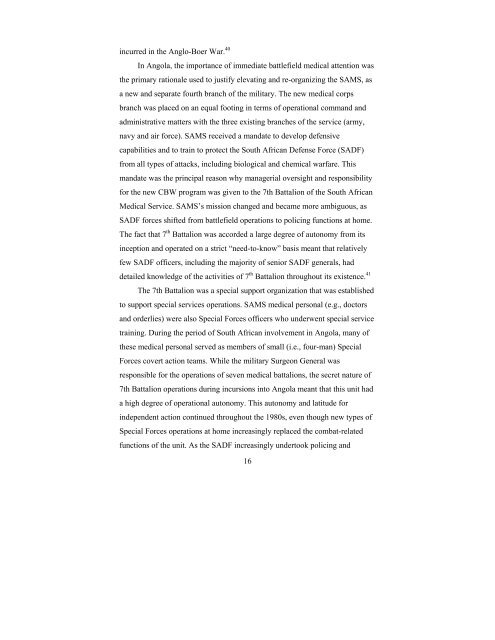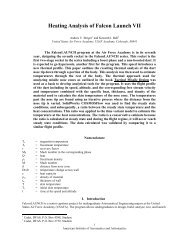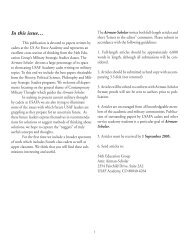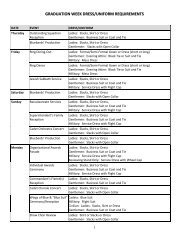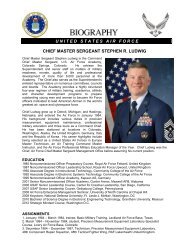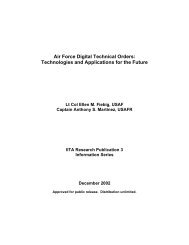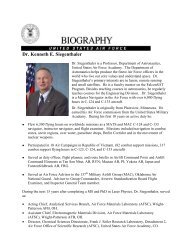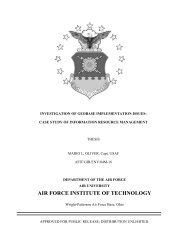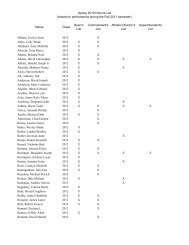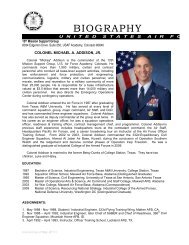the rollback of south africa's biological warfare program
the rollback of south africa's biological warfare program
the rollback of south africa's biological warfare program
Create successful ePaper yourself
Turn your PDF publications into a flip-book with our unique Google optimized e-Paper software.
incurred in <strong>the</strong> Anglo-Boer War. 40<br />
In Angola, <strong>the</strong> importance <strong>of</strong> immediate battlefield medical attention was<br />
<strong>the</strong> primary rationale used to justify elevating and re-organizing <strong>the</strong> SAMS, as<br />
a new and separate fourth branch <strong>of</strong> <strong>the</strong> military. The new medical corps<br />
branch was placed on an equal footing in terms <strong>of</strong> operational command and<br />
administrative matters with <strong>the</strong> three existing branches <strong>of</strong> <strong>the</strong> service (army,<br />
navy and air force). SAMS received a mandate to develop defensive<br />
capabilities and to train to protect <strong>the</strong> South African Defense Force (SADF)<br />
from all types <strong>of</strong> attacks, including <strong>biological</strong> and chemical <strong>warfare</strong>. This<br />
mandate was <strong>the</strong> principal reason why managerial oversight and responsibility<br />
for <strong>the</strong> new CBW <strong>program</strong> was given to <strong>the</strong> 7th Battalion <strong>of</strong> <strong>the</strong> South African<br />
Medical Service. SAMS’s mission changed and became more ambiguous, as<br />
SADF forces shifted from battlefield operations to policing functions at home.<br />
The fact that 7 th Battalion was accorded a large degree <strong>of</strong> autonomy from its<br />
inception and operated on a strict “need-to-know” basis meant that relatively<br />
few SADF <strong>of</strong>ficers, including <strong>the</strong> majority <strong>of</strong> senior SADF generals, had<br />
detailed knowledge <strong>of</strong> <strong>the</strong> activities <strong>of</strong> 7 th Battalion throughout its existence. 41<br />
The 7th Battalion was a special support organization that was established<br />
to support special services operations. SAMS medical personal (e.g., doctors<br />
and orderlies) were also Special Forces <strong>of</strong>ficers who underwent special service<br />
training. During <strong>the</strong> period <strong>of</strong> South African involvement in Angola, many <strong>of</strong><br />
<strong>the</strong>se medical personal served as members <strong>of</strong> small (i.e., four-man) Special<br />
Forces covert action teams. While <strong>the</strong> military Surgeon General was<br />
responsible for <strong>the</strong> operations <strong>of</strong> seven medical battalions, <strong>the</strong> secret nature <strong>of</strong><br />
7th Battalion operations during incursions into Angola meant that this unit had<br />
a high degree <strong>of</strong> operational autonomy. This autonomy and latitude for<br />
independent action continued throughout <strong>the</strong> 1980s, even though new types <strong>of</strong><br />
Special Forces operations at home increasingly replaced <strong>the</strong> combat-related<br />
functions <strong>of</strong> <strong>the</strong> unit. As <strong>the</strong> SADF increasingly undertook policing and<br />
16


